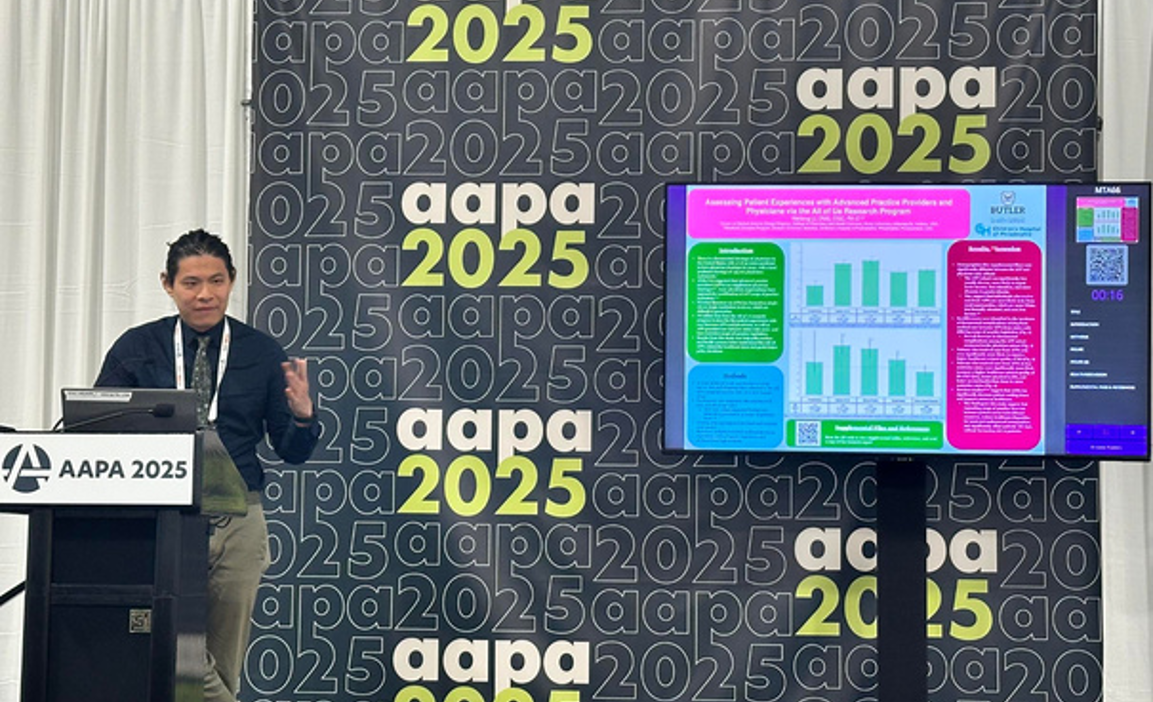Research Newsletter
Q2/2025
Learn about new PA research, find research support opportunities, and get AAPA Research updates. We hope you continue to check in to see the new content coming each quarter.
Upcoming Events
Research Connections
Join us for our quarterly networking sessions. Whether you’re a seasoned researcher or curious and eager to explore, this session provides a platform to exchange ideas, share insights, and forge valuable collaborations.
Click here to register in advance for June 26, September 25, and December 11!
Related links:
Want to highlight your research? Reach out to us at [email protected].
Join the Research community on Huddle
Sign up for our Research mailing list
View our top resources for aspiring researchers!
AAPA Strengthening Researchers
Funding Opportunities
There is still time to apply for the AAPA Small Research Grants. The submission cycle closes July 27. Learn more about AAPA and external funding opportunities here.
Looking for research guides?
AAPA’s Research team has curated a series of guides to help with various aspects of the research process. Whether you are a true novice looking for information on how to build a survey or a seasoned scholar aiming to submit to a journal, we have materials from trusted experts to help you achieve your goals. Learn more here.
Want more publications? Visit aapa.org/research.
PAs Going Beyond

In this “PAs Going Beyond” spotlight, we talked to Sarah Jane Garvick MS, MPAS, PA-C, a co-author on a recent study using semi-structured interviews to evaluate public perception about various types of primary care providers.
Q: What prompted you to embark on this research?
A: I have worked in geographically rural areas for my entire clinical career. In most of my clinical experience, especially in primary care, patient access to Advanced Practice Providers (APPs)- which includes PAs- has been excellent, but access to physicians (MD/DO) is often limited. Especially where physicians are limited, it is important to understand the perception of PAs so that we can better serve our patient populations, and they feel completely cared for. Our group decided to research this topic to capture data and help inform policies and promotion materials about PAs so that patients better understand our scope of practice and feel comfortable with the care they receive. In turn, this will help the PA profession as a while as communities continue to learn about and understand our training and clinical capabilities.
Q: What changes have you made to your clinical practice as a result of the work?
A: For patients who are hesitant to see a PA, whenever possible, my collaborating physician introduces me and makes a point to share how I will help care for them when he is not available. My collaborating physician also makes a point to share that we work together as a team and that he is always reachable if I have a question about their care plan. While this may seem unnecessary and take some of my time, I believe it helps to have physicians advocating for the PA profession in real time. In addition, I have held several free community events that highlight a particular part of medicine or common topic that patients have questions about. Having my collaborating physician promote these sessions has also helped to improve buy in from patients and demonstrate my knowledge and autonomy in clinical practice.
Q: Advice to PAs who are interested in engaging in this type of work at their own practice?
A: Holding informational sessions for your patients where the PA is the lead presenter shows that PAs are trained, educated, and committed to high quality care. Don’t be afraid to use social media to promote what PAs in your practice are capable of! Continuing to provide patient-centered care where patients feel heard and listened to as well as being present at community events continues to show the compassion and dedication to patients that PAs are known for.
Q: How has this benefited your patients?
A: When patients know that they are cared for by a qualified team, they often feel even more supported than if they had only a single physician.
Q: Anything else that you would like to share with PAs?
A: Advocacy for the PA profession is important! There is nothing that is going to change a patient’s mind about wanting a provider that has experience and training but explaining and demonstrating the collaborative nature of our work as well as our background and training can make a difference in patient’s opinions and trust!

ePosters at AAPA 2025
AAPA 2025 showcased research projects by PAs and PA students with poster presentations on workforce, education, clinical, and quality improvement topics. Top student posters received awards from JAAPA. Congratulations to this year’s winners and watch out for next year’s submission call opening in December!
Related links:
CME (RIA and Rounds)
ePosters
JAAPA Collections
Research Events at AAPA Conference

Newest Research on the PA Profession
PA researchers are invited to participate in written interviews with members of our Research team. Recently submitted interesting data? Won a small research grant? Share your insights on the successes and challenges of gathering data, filling knowledge gaps, and why research is paramount to the PA profession.
Here are a few articles we think you should see:
The article “What If…The Impact of Institutional Accreditation on PA Programs Transitioning to an Entry-Level Professional Doctorate Degree” by Jennifer A. Snyder and Anthony Miller, discusses the impact of institutional accreditation on PA programs transitioning to an entry-level professional doctorate degree. Read more here.
The study “Physician assistants as primary investigators: options for advancing your career through clinical research” by Caitlin Arnone explores what is needed for a PAs to become principal investigators and the need to advocate for this career options such as those in clinical research. Read the study here.
Latest AAPA Publications
Thanks to your survey responses, we can include the latest data in our research reports, publications, News Central articles, and extended data briefs. Check out a sample of our latest publications below:
Read about the Top 10 Highest Paying Specialties in the PA Profession in 2024, including median compensation amount, median bonus, and hours worked for each specialty listed, in our latest New Central. Be on the lookout for the 2025 Salary Report PDF later this summer and add the Digital Salary Report page to your bookmarks!
Learn more about PAs and Emerging Healthcare Technology here:
Data brief: PAs and Emerging Healthcare Technology
Data Dose: PAs and Emerging Technology
Want more publications? Visit www.aapa.org/research/research-publications/.